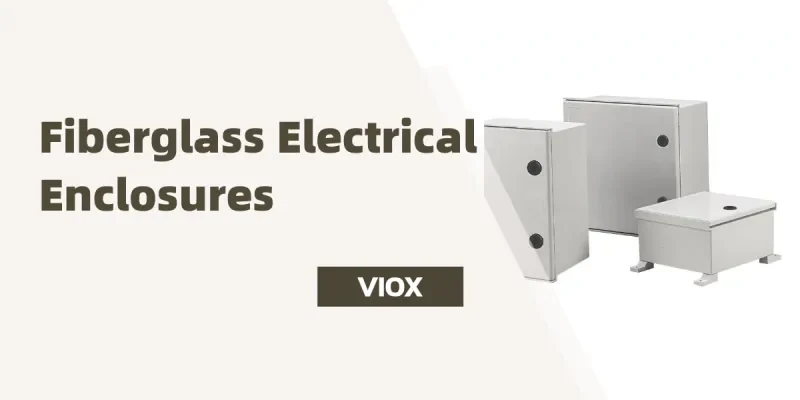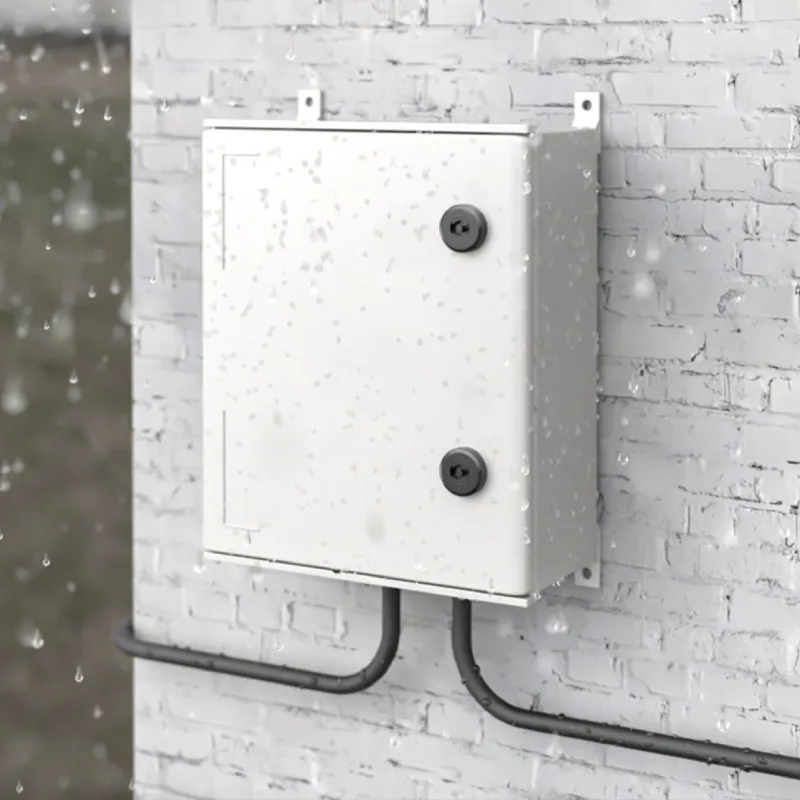Τα ηλεκτρικά περιβλήματα από υαλοβάμβακα είναι εξειδικευμένα προστατευτικά περιβλήματα που έχουν σχεδιαστεί για να προστατεύουν τον ηλεκτρικό εξοπλισμό από περιβαλλοντικούς κινδύνους, προσφέροντας ανώτερη αντοχή στη διάβρωση, ηλεκτρική μόνωση και ανθεκτικότητα σε σύγκριση με τις παραδοσιακές εναλλακτικές λύσεις από μέταλλο ή πλαστικό.
Ηλεκτρικά περιβλήματα από υαλοβάμβακα
Διάβρωση και χημική αντοχή
Γνωστά για την εξαιρετική αντοχή τους σε διαβρωτικούς παράγοντες και χημικές ουσίες, τα περιβλήματα από υαλοβάμβακα διατηρούν την ακεραιότητά τους σε σκληρά περιβάλλοντα, όπου οι μεταλλικές εναλλακτικές λύσεις θα υποβαθμίζονταν γρήγορα. Αυτή η ανθεκτικότητα τα καθιστά ιδανικά για εφαρμογές που εκτίθενται σε υγρασία, αλμυρό νερό και επιθετικές ουσίες. Η μη πορώδης φύση του σύνθετου υλικού αποτρέπει την απορρόφηση διαβρωτικών στοιχείων, εξασφαλίζοντας μακροπρόθεσμη προστασία για τον ευαίσθητο ηλεκτρικό εξοπλισμό ακόμη και στις πιο δύσκολες βιομηχανικές συνθήκες. Αυτή η ανθεκτικότητα μεταφράζεται σε μειωμένο κόστος συντήρησης και παρατεταμένη διάρκεια λειτουργίας, καθιστώντας τα περιβλήματα από υαλοβάμβακα μια οικονομικά αποδοτική επιλογή για βιομηχανίες που ασχολούνται με διαβρωτικές ατμόσφαιρες.
Οφέλη ηλεκτρικής μόνωσης
Ένα από τα ιδιαίτερα χαρακτηριστικά των ηλεκτρικών περιβλημάτων από υαλοβάμβακα είναι οι εξαιρετικές μη αγώγιμες ιδιότητές τους, οι οποίες ενισχύουν σημαντικά την ασφάλεια στις ηλεκτρικές εγκαταστάσεις. Σε αντίθεση με τα μεταλλικά περιβλήματα, το υαλοβάμβακας δεν αγωγιμοποιείται, μειώνοντας τον κίνδυνο ηλεκτροπληξίας και καθιστώντας το ιδανική επιλογή για τη στέγαση εξοπλισμού υψηλής τάσης. Αυτή η εγγενής ικανότητα μόνωσης συμβάλλει επίσης στην ηλεκτρομαγνητική συμβατότητα (EMC) των περιβλημάτων, βοηθώντας στη θωράκιση των ευαίσθητων ηλεκτρονικών εξαρτημάτων από εξωτερικές ηλεκτρομαγνητικές παρεμβολές. Η μη αγώγιμη φύση του υαλοβάμβακα επιτρέπει περαιτέρω μεγαλύτερη ευελιξία στο σχεδιασμό, καθώς εξαλείφει την ανάγκη για πρόσθετα στρώματα μόνωσης που μπορεί να απαιτούνται σε μεταλλικά περιβλήματα.
Ελαφρύς και ανθεκτικός σχεδιασμός
Τα ηλεκτρικά περιβλήματα από υαλοβάμβακα προσφέρουν ένα μοναδικό συνδυασμό ελαφριάς κατασκευής και εξαιρετικής ανθεκτικότητας, καθιστώντας τα ιδανική επιλογή για διάφορες εφαρμογές. Η ενίσχυση από ίνες γυαλιού σε αυτά τα περιβλήματα παρέχει υψηλή αντοχή σε κάμψη, επιτρέποντάς τους να αντέχουν σε σημαντικές φυσικές καταπονήσεις χωρίς να διακυβεύεται η δομική τους ακεραιότητα.
Παρά τη στιβαρή φύση τους, τα περιβλήματα από υαλοβάμβακα είναι σημαντικά ελαφρύτερα από τα αντίστοιχα μεταλλικά. Αυτό το ελαφρύ χαρακτηριστικό προσφέρει πολλά πλεονεκτήματα:
- Ευκολότερη εγκατάσταση και χειρισμός, μείωση του κόστους εργασίας και του χρόνου εγκατάστασης.
- Χαμηλότερα έξοδα μεταφοράς λόγω μειωμένου βάρους αποστολής.
- Μειωμένη καταπόνηση των δομών στήριξης, ιδιαίτερα σημαντική σε εφαρμογές όπου το βάρος είναι κρίσιμος παράγοντας.
Η ανθεκτικότητα των περιβλημάτων από υαλοβάμβακα ενισχύεται περαιτέρω από την αντοχή τους στις κρούσεις, τις καιρικές συνθήκες και την υπεριώδη ακτινοβολία. Σε αντίθεση με ορισμένες εναλλακτικές λύσεις από πλαστικό, το fiberglass διατηρεί τις δομικές του ιδιότητες σε ένα ευρύ φάσμα θερμοκρασιών, εξασφαλίζοντας αξιόπιστη απόδοση τόσο σε ακραίο κρύο όσο και σε ζέστη.
Επιπλέον, η διαδικασία χύτευσης που χρησιμοποιείται για την κατασκευή περιβλημάτων από υαλοβάμβακα επιτρέπει μεγαλύτερη ευελιξία στο σχεδιασμό. Πολύπλοκα σχήματα και προσαρμοσμένα μεγέθη μπορούν εύκολα να παραχθούν για να ικανοποιήσουν συγκεκριμένες απαιτήσεις εφαρμογών. Αυτή η ευελιξία, σε συνδυασμό με την εγγενή αντοχή του υλικού, επιτρέπει τη δημιουργία μεγάλων, απρόσκοπτων περιβλημάτων που διατηρούν τις προστατευτικές τους ιδιότητες χωρίς την ανάγκη για αρμούς ή ραφές που θα μπορούσαν να θέσουν σε κίνδυνο την ακεραιότητα.
Η μακροπρόθεσμη ανθεκτικότητα των περιβλημάτων από υαλοβάμβακα μεταφράζεται σε εξοικονόμηση κόστους με την πάροδο του χρόνου. Η αντοχή τους σε περιβαλλοντικούς παράγοντες και φυσική καταπόνηση σημαίνει λιγότερο συχνή αντικατάσταση και χαμηλότερες απαιτήσεις συντήρησης σε σύγκριση με άλλα υλικά. Αυτή η μακροζωία καθιστά τα περιβλήματα από υαλοβάμβακα μια οικονομικά αποδοτική λύση για την προστασία του ηλεκτρικού εξοπλισμού σε απαιτητικά περιβάλλοντα, εξισορροπώντας την αρχική επένδυση με τα μακροπρόθεσμα λειτουργικά οφέλη.
Επισκόπηση εφαρμογών της βιομηχανίας
Τα ηλεκτρικά περιβλήματα από υαλοβάμβακα βρίσκουν ευρεία χρήση σε διάφορες βιομηχανίες λόγω των ευέλικτων ιδιοτήτων τους. Ακολουθεί μια επισκόπηση των βασικών εφαρμογών:
- Εξωτερικά και θαλάσσια περιβάλλοντα: Ιδανικό για την προστασία του εξοπλισμού από την υγρασία, το θαλασσινό νερό και τις δύσκολες καιρικές συνθήκες.
- Εγκαταστάσεις χημικής επεξεργασίας: Ανθεκτικό σε διαβρωτικές χημικές ουσίες, εξασφαλίζοντας μακροζωία σε επιθετικές βιομηχανικές συνθήκες.
- Βιομηχανία τροφίμων και ποτών: Η μη πορώδης επιφάνεια αποτρέπει την ανάπτυξη βακτηρίων, ικανοποιώντας τα πρότυπα υγιεινής.
- Εγκαταστάσεις επεξεργασίας λυμάτων: Αντέχει στην έκθεση σε διαβρωτικά αέρια και υγρά που είναι συνηθισμένα σε αυτά τα περιβάλλοντα.
- Τηλεπικοινωνίες: Παρέχει θωράκιση EMC για ευαίσθητο ηλεκτρονικό εξοπλισμό.
- Τομέας πετρελαίου και φυσικού αερίου: Προσφέρει προστασία από εκρηκτικές ατμόσφαιρες και διαβρωτικά υλικά.
- Υποδομές μεταφορών: Χρησιμοποιείται σε συστήματα ελέγχου κυκλοφορίας και σε περιβλήματα εξοπλισμού σιδηροδρομικής σηματοδότησης.
- Ανανεώσιμες πηγές ενέργειας: Προστατεύει τους ηλιακούς μετατροπείς και τα συστήματα ελέγχου ανεμογεννητριών από περιβαλλοντικούς παράγοντες.
Αυτές οι εφαρμογές αξιοποιούν τον μοναδικό συνδυασμό αντοχής στη διάβρωση, ηλεκτρικής μόνωσης και ανθεκτικότητας των περιβλημάτων από υαλοβάμβακα για την προστασία κρίσιμου εξοπλισμού σε διάφορες βιομηχανικές εγκαταστάσεις.
Συγκριτική ανάλυση με μεταλλικά περιβλήματα
Τα ηλεκτρικά περιβλήματα από υαλοβάμβακα προσφέρουν σαφή πλεονεκτήματα έναντι των μεταλλικών εναλλακτικών λύσεων από διάφορες απόψεις. Ακολουθεί μια συγκριτική ανάλυση των βασικών χαρακτηριστικών:
| Χαρακτηριστικό | Περιβλήματα από υαλοβάμβακα | Μεταλλικά περιβλήματα |
|---|---|---|
| Αντοχή στη διάβρωση | Ανώτερη αντοχή σε σκληρές χημικές ουσίες και περιβάλλοντα. | Ευαίσθητο στη σκουριά και τη διάβρωση. |
| Βάρος | Ελαφρύ, ευκολότερη εγκατάσταση. | Βαρύτερο, μπορεί να χρειαστεί πρόσθετη στήριξη. |
| Ηλεκτρική μόνωση | Εξαιρετικές μη αγώγιμες ιδιότητες. | Αγώγιμο, μπορεί να απαιτεί πρόσθετη μόνωση. |
| Προσαρμογή | Διαμορφώνεται εύκολα σε διάφορα σχήματα και μεγέθη. | Περιορίζεται από τις διαδικασίες κατασκευής. |
| Συντήρηση | Χαμηλή συντήρηση λόγω αντοχής στη διάβρωση. | Μπορεί να απαιτεί τακτική συντήρηση για την αποφυγή σκουριάς. |
| Θωράκιση EMC | Παρέχει φυσική θωράκιση EMC. | Εξαιρετικές δυνατότητες θωράκισης EMC. |
| Διασπορά θερμότητας | Κακές ιδιότητες απαγωγής θερμότητας. | Καλύτερη απαγωγή θερμότητας. |
| Κόστος | Αρχικά πιο ακριβό, αλλά μακροπρόθεσμα οικονομικά αποδοτικό. | Γενικά χαμηλότερο αρχικό κόστος. |
Ενώ τα μεταλλικά περιβλήματα υπερέχουν στην απαγωγή θερμότητας και τη θωράκιση ΗΜΣ, τα περιβλήματα από υαλοβάμβακα προσφέρουν ανώτερη αντοχή στη διάβρωση, μικρότερο βάρος και καλύτερη ηλεκτρική μόνωση. Η επιλογή μεταξύ των δύο εξαρτάται συχνά από τις συγκεκριμένες απαιτήσεις της εφαρμογής και τις περιβαλλοντικές συνθήκες.
Περιβαλλοντικές επιπτώσεις και βιωσιμότητα
Τα ηλεκτρικά περιβλήματα από υαλοβάμβακα προσφέρουν αρκετά περιβαλλοντικά πλεονεκτήματα σε σχέση με τα παραδοσιακά υλικά. Η διαδικασία κατασκευής των σύνθετων υλικών από υαλοβάμβακα καταναλώνει συνήθως λιγότερη ενέργεια σε σύγκριση με την παραγωγή μετάλλων, με αποτέλεσμα χαμηλότερο αποτύπωμα άνθρακα. Επιπλέον, τα περιβλήματα από υαλοβάμβακα έχουν μεγαλύτερη διάρκεια ζωής λόγω της αντοχής τους στη διάβρωση, μειώνοντας την ανάγκη για συχνές αντικαταστάσεις και ελαχιστοποιώντας τα απόβλητα.
Από την άποψη της βιωσιμότητας, τα περιβλήματα από υαλοβάμβακα παράγονται όλο και περισσότερο με τη χρήση ανακυκλωμένων υλικών. Η βιομηχανία κατασκευής μονωτικών υαλοπινάκων έχει κάνει σημαντικά βήματα στην ανακύκλωση, με ορισμένα προϊόντα να περιέχουν έως και 80% ανακυκλωμένο γυαλί. Αυτή η πρακτική όχι μόνο εξοικονομεί πόρους αλλά και μειώνει τα απόβλητα από την υγειονομική ταφή. Ωστόσο, είναι σημαντικό να σημειωθεί ότι ενώ το fiberglass είναι ανακυκλώσιμο, η διαδικασία μπορεί να είναι πολύπλοκη και δεν είναι τόσο διαδεδομένη όσο η ανακύκλωση για άλλα υλικά. Οι κατασκευαστές εργάζονται συνεχώς για τη βελτίωση των επιλογών ανακύκλωσης στο τέλος του κύκλου ζωής των προϊόντων από υαλοβάμβακα, ώστε να βελτιώσουν περαιτέρω το περιβαλλοντικό τους προφίλ.
Κορυφαίοι κατασκευαστές και μάρκες
Αρκετές εταιρείες έχουν καθιερωθεί ως ηγέτες στη βιομηχανία ηλεκτρικών περιβλημάτων από υαλοβάμβακα:
- Περιβλήματα Stahlin: Πρωτοπόρος με σχεδόν 60 χρόνια εμπειρίας, η Stahlin προσφέρει μια ευρεία γκάμα προϊόντων με προστασία NEMA 4X και IP.
- Allied Moulded Products: Γνωστή για τη σειρά AM και τη σειρά AMHD-R, συμπεριλαμβανομένων εξειδικευμένων περιβλημάτων για την αποθήκευση ηλιακής ενέργειας.
- Fibox: Με πάνω από 40 χρόνια εμπειρίας, η Fibox έχει αναπτύξει περισσότερες από 17 οικογένειες λύσεων περιβλήματος.
- Bud Industries: Ένας από τους πιο γνωστούς κατασκευαστές των ΗΠΑ, που προσφέρει ένα εκτεταμένο χαρτοφυλάκιο με επιλογές IP65/IP66/IP67.
- VIOX: Παρέχει μεγάλη ποικιλία περιβλημάτων από υαλοβάμβακα, συμπεριλαμβανομένων προσαρμοσμένων επιλογών.
Αυτοί οι κατασκευαστές επικεντρώνονται στην ανάπτυξη υψηλής ποιότητας, ανθεκτικών περιβλημάτων που πληρούν τα αυστηρά βιομηχανικά πρότυπα, ενώ παράλληλα προσφέρουν προσαρμογή ώστε να ανταποκρίνονται στις ανάγκες συγκεκριμένων εφαρμογών.
Πρότυπα ποιότητας και πιστοποιήσεις
Τα ηλεκτρικά περιβλήματα από υαλοβάμβακα υπόκεινται σε αυστηρά πρότυπα ποιότητας και πιστοποιήσεις, ώστε να διασφαλίζεται η απόδοση και η ασφάλειά τους σε διάφορες εφαρμογές. Τα βασικά πρότυπα περιλαμβάνουν:
- Βαθμολογίες NEMA: Πολλά περιβλήματα από υαλοβάμβακα πληρούν τις προδιαγραφές NEMA 4X, παρέχοντας προστασία από τη διάβρωση, τη σκόνη που φυσάει ο άνεμος, τη βροχή, το πιτσίλισμα νερού και το νερό που κατευθύνεται με λάστιχο.
- Βαθμολογίες IP: Τα περιβλήματα συχνά φέρουν τις διαβαθμίσεις IP65, IP66 ή IP67, υποδεικνύοντας προστασία από τη σκόνη και τη διείσδυση νερού.
- Καταχωρίσεις UL: Οι πιστοποιήσεις Underwriters Laboratories (UL), όπως UL 50 και UL 508A, επικυρώνουν την ασφάλεια και την απόδοση των περιβλημάτων.
- Συμμόρφωση RoHS: Πολλοί κατασκευαστές διασφαλίζουν ότι τα προϊόντα τους συμμορφώνονται με τις οδηγίες για τον περιορισμό των επικίνδυνων ουσιών (RoHS).
- Πιστοποιήσεις ISO: Οι κορυφαίοι κατασκευαστές διαθέτουν συχνά πιστοποιήσεις ISO 9001:2015, οι οποίες αποδεικνύουν την τήρηση συστημάτων διαχείρισης ποιότητας.



